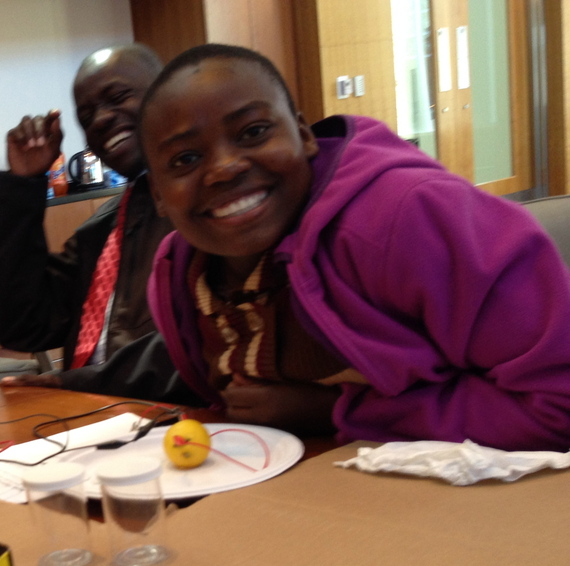"I was not born to be unseen"
Meet Mercy. She is a spunky, determined 17-year-old with a twinkle in her eye. Mercy has many passions, goals and hopes for her future, just like most girls her age. She is an aspiring engineer, change maker in her community of Muhuru Bay, Kenya and most importantly, a future high school graduate at the WISER secondary school in rural Kenya, During her visit to Duke University in early April, she shared her ultimate dream with a classroom full of students; "I want to use my education to make a change in my community, to bring them up."
However, graduation and a bright professional future were not always within the realm of possibility for Mercy and other girls in Muhuru Bay. In fact, despite the proven economic and societal benefits of educating a girl, completing high school is not the typical experience of many adolescent women in developing countries around the world. WISER is changing that.
WISER (the Women's Institute for Secondary Education and Research) is a community development organization focused on the social empowerment of underprivileged girls through education and health. Founded by Dr. Sherryl Broverman, Professor of Biology and Global Health at Duke University, and Andrew Cunningham Duke '08, WISER works holistically to improve health, education and economic outcomes for girls, particularly those orphaned by AIDS. Through WISER's education and health programs Mercy and her fellow students now harness the power of their voices and fulfill their dreams.
Girls looking to further their education in communities like Muhuru Bay face many obstacles that extend far beyond accessibility to school. They are confronted with challenges such as lack of access to clean drinking water, sexual and physical abuse, and HIV/AIDS. Combine this with a sociocultural environment that does not value the role of girls in society or believe they are worth educating, and you have a serious obstacle to overcome in providing education to young women. WISER is unique because it takes a comprehensive approach to girls' education. The organization recognizes the interconnectivity of the environmental elements necessary for the successful delivery of education in developing countries and has a proven model. WISER provides its students with everything they need to attend school, from underwear and sanitary pads, to nutritional meals, health care, psychosocial support through counseling and school supplies. Most importantly it provides girls a safe and supportive community that lives and grows together. Furthermore, WISER has provided the first clean drinking water in the area, serving over 5,000 community members, including the Ministry of Health clinic, and is currently expanding its capacity to reach 20,000 members.
To date, the organization has increased the number of girls completing primary school in Muhuru Bay by 120 percent and improved their academic outcomes. The WISER secondary school has a zero percent attrition rate due to pregnancy and child marriage, as opposed to 30 percent attrition in neighboring schools On March 7, 2014, a celebration was held for the first graduating class. All 28 graduates passed the national exam and over half will attend universities with scholarships. To put this in perspective, in the last 30 years, only one girl has continued on to university from Muhuru Bay. The graduation ceremony attracted over 1,000 community members, including Kenyan dignitaries, to celebrate the graduates and WISER's success in empowering underprivileged girls. In short, WISER works.
WISER's achievements cannot solely be measured by numbers. During Mercy's visit to Duke this month, she attended engineering classes and spoke eloquently to a room of 200 students. It is clear that WISER has given Mercy the tools to empower herself, and use her voice to bring awareness to the obstacles she has overcome, but many girls still face in rural Kenya.
WISER is changing the way Muhuru Bay and its surrounding communities view girls. By keeping girls in school and reducing young pregnancies, WISER is enabling girls to transform themselves into academic powerhouses that outcompete boys from well-established schools. Girls that were not considered worth educating are now the top students in the country in math and science. "This is what education is all about -- not just the inputs, but also the dynamic, committed and intelligent processes of teaching and learning that is occurring within WISER's walls," says Andy Cunningham.
Mercy is the Girl Effect in action. Her peers are the Girl Effect in action. WISER is the Girl Effect in action.


